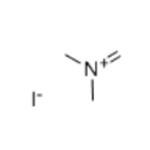Description
N, N-Dimethylmethyleneammonium iodide (DMMIA) is a versatile quaternary ammonium compound characterized by its unique chemical structure and widely utilized in scientific research. This colorless salt readily dissolves in water and has a melting point of 197°C. DMMIA is a crucial reagent in various laboratory experiments, contributing significantly to synthesis processes. Moreover, it finds application in biochemical studies, showcasing diverse biochemical and physiological effects. Its importance in scientific research is evident, as it serves as a reagent for organic synthesis, a catalyst for alcohol oxidation, and a key component in producing heterocyclic compounds. Additionally, it is utilized in synthesizing surfactants and other amphiphilic molecules. Furthermore, DMMIA aids in studying enzyme kinetics by effectively inhibiting certain enzyme activities.
Chemical Properties
CREAM TO YELLOW CRYSTALLINE POWDER
Uses
(N,N-Dimethyl)methyleneammonium iodide is a useful reagent for many synthetic applications like aminomethylation. It is also essential for the conversion of ketones to α, β-unsaturated enones. It is utilized to prepare derivatives of the type RCH2N(CH3)2. It is extensively used in medicines like painkillers and sedatives- Tramadol hydrochloride intermediate viz. 2-dimethylamine methylcyclohexanone. It is also employed in reactive dyes, synthesized spices. It plays an essential role in Mannich reactions.
Uses
In organic synthesis.
General Description
N,N-Dimethylmethyleneiminium iodide is useful reagent for many synthetic applications, especially aminomethylation and conversion of ketones to α,βunsaturated enones.
Synthesis
The mixture of trimethylamine, diiodomethane, dioxane and absolute ethanol was placed in the dark to react at room temperature for 100 h, the resulting crystals were collected by filtration, washed with ethanol and ether in turn, and dried under vacuum at 70 °C to obtain iodomethyl trimethylMethylammonium iodide. It was heated with sulfolane and kept at 160 °C for 12 min. The precipitated crystals were collected by filtration, washed with carbon tetrachloride, and vacuum dried at 50 °C to obtain N,N-DiMethylMethyleneaMMoniuM Iodide.





